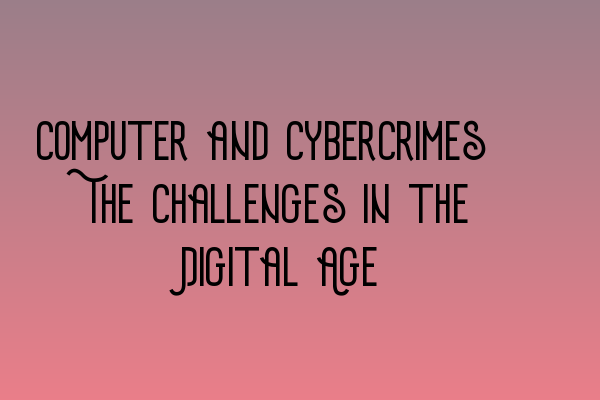Computer and Cybercrimes: The Challenges in the Digital Age
Welcome to the SQE Criminal Law & Practice Law UK blog! In today’s digital age, computer and cybercrimes pose unique challenges for law enforcement agencies and legal professionals. As technology advances at a rapid pace, criminals are finding new ways to exploit it for illicit purposes. This has led to a surge in cybercrimes, including hacking, online fraud, identity theft, and data breaches. In this blog post, we will explore the complexities of computer and cybercrimes and discuss the challenges faced by the legal community in combating these offenses.
The Rise of Cybercrimes
With the increasing interconnectedness of our society, cybercrimes have become a global epidemic. Criminals no longer need physical access to their targets; they can remain anonymous and launch attacks from anywhere in the world. This anonymity has emboldened hackers and criminals, making it increasingly difficult to apprehend and prosecute them.
To effectively combat cybercrimes, legal professionals must stay abreast of the latest trends and techniques employed by criminals. It is vital for solicitors, lawyers, and law enforcement agencies to regularly update their knowledge and skills through continuing professional development programs and specialised training courses, such as SQE 2 Preparation Courses.
Legal Challenges in Dealing with Cybercrimes
The ever-evolving nature of technology creates a multitude of legal challenges when dealing with cybercrimes. One such challenge is the difficulty in attributing cybercrimes to specific individuals or groups. Hackers often employ various techniques to mask their identities and obfuscate their tracks, making it arduous for law enforcement agencies to gather evidence and identify the perpetrators.
Furthermore, cross-jurisdictional issues frequently arise in cybercrime cases. Criminals can carry out attacks from one country, targeting victims in another. This raises complex legal issues related to jurisdiction, extradition, and mutual legal assistance. Solicitors and legal professionals need to navigate these complexities efficiently to ensure justice is served. Keeping track of SRA SQE Exam Dates can help them stay updated and plan their preparation accordingly.
The Role of Digital Forensics
Digital forensics is a crucial tool in investigating cybercrimes. It involves the collection and analysis of digital evidence to uncover the truth. However, the exponential growth in the volume and complexity of digital evidence presents immense challenges to legal professionals.
To effectively utilize digital forensics in cybercrime investigations, legal professionals must possess a thorough understanding of the latest forensic techniques and tools. Continuous learning and practical experience gained through SQE 1 Practice Exam Questions and SQE 1 Practice Mocks FLK1 FLK2 can greatly enhance their expertise in this area.
Collaboration and International Cooperation
Given the global nature of cybercrimes, collaboration and international cooperation among law enforcement agencies and legal professionals are paramount. Sharing information, best practices, and intelligence can assist in identifying and apprehending cybercriminals. Legal professionals with a solid foundation in criminal law and practice can contribute significantly to these collaborative efforts.
If you’re interested in pursuing a career in criminal law and practice, consider enrolling in SQE 1 Preparation Courses. These courses provide the necessary knowledge and skills to excel in your legal career and navigate the complexities of computer and cybercrimes.
Conclusion
Computer and cybercrimes pose significant challenges in the digital age. The ever-changing landscape of technology necessitates continuous learning and adaptation by legal professionals. With comprehensive training, practical experience, and continuous professional development, solicitors and lawyers can effectively combat cybercrimes and ensure justice is served in our increasingly interconnected world.
